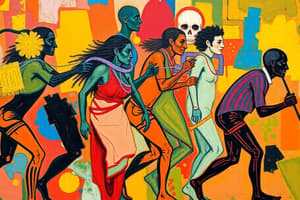Podcast
Questions and Answers
How does symbolic thinking contribute to communication?
How does symbolic thinking contribute to communication?
Symbolic thinking allows individuals to represent abstract concepts through symbols, making it easier to convey and share ideas.
What role does language play in cultural knowledge transmission?
What role does language play in cultural knowledge transmission?
Language acts as a complex system for transmitting cultural knowledge, facilitating the expression of thoughts and ideas.
Explain how complex problem-solving drives innovation.
Explain how complex problem-solving drives innovation.
Complex problem-solving involves analyzing situations and developing solutions, which fosters adaptation and leads to innovative ideas.
Describe the process of cultural knowledge preservation through observation.
Describe the process of cultural knowledge preservation through observation.
How does imitation play a role in skill acquisition within a culture?
How does imitation play a role in skill acquisition within a culture?
How can culture be considered a by-product of human evolution?
How can culture be considered a by-product of human evolution?
In what ways does evolution influence human adaptation to the environment?
In what ways does evolution influence human adaptation to the environment?
What key components are encompassed by the definition of culture?
What key components are encompassed by the definition of culture?
Why is it important to recognize multiple species of early humans in the study of evolution?
Why is it important to recognize multiple species of early humans in the study of evolution?
What role do cultural technologies play in human survival?
What role do cultural technologies play in human survival?
How do language, symbols, myths, and stories contribute to cultural transmission?
How do language, symbols, myths, and stories contribute to cultural transmission?
What are some transmission methods through which cultural knowledge is passed down?
What are some transmission methods through which cultural knowledge is passed down?
In what ways does cultural transmission impact individual identity?
In what ways does cultural transmission impact individual identity?
What are the key components of cultural evolution?
What are the key components of cultural evolution?
How does adaptation play a role in cultural evolution?
How does adaptation play a role in cultural evolution?
How do tools and technology reflect cultural values?
How do tools and technology reflect cultural values?
In what ways do art and objects help preserve cultural traditions?
In what ways do art and objects help preserve cultural traditions?
What role do norms play in shaping social interactions within a community?
What role do norms play in shaping social interactions within a community?
How do values differ from beliefs in the context of cultural identity?
How do values differ from beliefs in the context of cultural identity?
Describe the significance of rituals in cultural expressions.
Describe the significance of rituals in cultural expressions.
Flashcards are hidden until you start studying
Study Notes
Human Capacity for Culture
- Culture encompasses beliefs, practices, values, attitudes, laws, norms, artifacts, symbols, and knowledge shared within a society.
- It evolves as humans strive to survive and adapt to their environment, overcoming biological limitations.
- Cultural technologies have developed over time to facilitate efficient food acquisition and predator deterrence.
Evolution
- Evolution represents biological changes in populations across generations, aiding in the understanding of human physiological development.
- Recognized species of early humans range between 15 to 20 different types.
- Human progression reflects the ability to adapt and cope with environmental challenges.
Language, Symbolic Thinking, and Complex Problem Solving
- Language is vital for communication and cultural knowledge sharing.
- Symbolic thinking allows the understanding of abstract concepts, essential for collective cultural comprehension.
- Complex problem solving drives innovation and the adaptation of practices to dynamic situations.
Three Pillars of Cultural Capacity
- Symbolic Thinking: Utilizes symbols to convey abstract concepts and enhance communication.
- Language: A complex system that permits the transmission of cultural knowledge and personal expression.
- Complex Problem-Solving: Enables analysis of situations and formulation of effective solutions, facilitating adaptation and innovation.
Learning Mechanisms
- Cultural knowledge is transmitted through observation, imitation, and teaching, contributing to its preservation and evolution.
- Observation: Provides insights into cultural norms and practices.
- Imitation: Helps individuals acquire skills by replicating others' actions.
- Teaching: Explicitly allows the transfer of knowledge and skills from one generation to another.
Expression and Preservation
- Tools, technology, and art serve as reflections of cultural values, helping link past traditions to present and future practices.
- Tools and Technology: Illustrate cultural priorities and human ingenuity.
- Art and Objects: Communicate cultural beliefs and serve to preserve traditions over time.
Norms, Values, Beliefs, and Rituals
- These elements shape social interactions and contribute to community identity.
- Norms: Unwritten rules that guide behavior within societies.
- Values: Core beliefs determining what is deemed important and ethical.
- Beliefs: Specific ideas held about the world and human existence.
- Rituals: Symbolic actions that hold cultural significance and reinforce group identity.
Cultural Transmission
- Cultural knowledge is handed down through generations, impacting identity and behavior.
- Language, Symbols, Myths, and Stories: Facilitate understanding of the world and pass down cultural wisdom.
- Transmission Methods: Educational practices, familial teachings, observation, imitation, and collective rituals all play a role.
- Impact on Identity: Cultural transmission shapes values, instills beliefs, and fosters a sense of belonging among community members.
Cultural Evolution
- Cultural dynamics involve innovation, diffusion, and adaptation to remain relevant in changing contexts.
- Innovation: Refers to the creation of new practices or technologies that enhance culture.
- Diffusion: Describes the spread of cultural traits and practices among different societies.
- Adaptation: Involves modifying existing practices to better fit evolving environmental conditions.
Studying That Suits You
Use AI to generate personalized quizzes and flashcards to suit your learning preferences.




